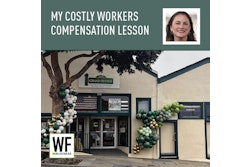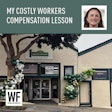On that special day when family and friends come together to celebrate a couple's marriage, nobody wants to think about the possibility of that union ending, but as statistics show, divorce is a reality. So when Jim set up his retirement plan from the family's hardwood flooring contracting business five years ago, he asked an attorney for advice on how to transfer the stock to his five children while preventing the business from being carved up in case any of them divorced. The answer was the traditional use of a trust to transfer the stock of the business from members of one generation to the next. However, the virtual gifting of the stock to the trust, of which the children were beneficiaries, was contingent upon two conditions: one, that the children would provide Jim and his wife with an income stream for the rest of both of their lives; and two, that all his sons-in-law and daughters-in-law sign a postnuptial agreement.
Jim and his wife knew that the agreement might create tension in their relationships with their children's spouses, but their first commitment was to protecting the company, knowing that multiple divorces could cripple the family business.
This is a perplexing problem not unlike what many business-owning families face today. The good news is that there are a number of estate planning tools that can be used to "divorceproof " your business. Remember, however, each one requires advanced planning and preparation with an attorney. Here are some things to consider as you work with your attorney to create a plan for your own business.
Pre/Postnuptial Agreements
Make sure to specifically reference the business so it is not treated as a general asset regarding this type of agreement. Any ambiguity can and usually does cause problems in the event of divorce. The bestowal of the future appreciation in the value of the business, annual income, profits of the business during marriage, as well as any assets that are integral to the business but are not part of it, should all be specifically defined. Other considerations include:
• The agreement alone does not eliminate a spouse's right to certain retirement interests.
• An inaccurate valuation of the business, or incomplete or ambiguous disclosure of other financial interests and obligations, can invalidate the agreement.
• The agreement must conform to other estate-planning documents.
• The two parties should always use separate legal counsel.
• The possible sting of a prenuptial or postnuptial agreement might be reduced if signing one is made a matter of company policy.
Trusts
You can spare your children the emotional trauma of having to negotiate a prenuptial or postnuptial agreement by gifting company stock to a trust. A welldrafted trust should contain a "spendthrift" provision stipulating that the beneficiary's assets are separate from the marital estate and immune from the claims of any creditors. In the context of divorce, a spouse is a creditor. However, you can't create a trust to protect your own assets from the claims of a spouse or other creditors. Also, be careful that the termination of the trust is far enough in the future that the assets don't come into the marital estate.
Buy/Sell Agreements
A good buy/sell agreement restricts the transfer of company stock to an outsider by giving the active shareholding family purchasing rights upon certain triggering events, such as a divorce. One of the rights often stipulated is the right of first refusal, which gives the company or shareholders the opportunity to purchase shares before anyone else. For example, suppose that a divorce judge gives an ex-spouse some company stock. The company or other shareholders would have the right to buy that stock from the family member and give the departing spouse cash rather than an interest in the business. You can deal with all these issues in one document and make it less personal and less related to marriage. When drafting the agreement, be sure to cover divorce specifically as a triggering event. It's also a good idea to decide how the stock will be priced and how the purchase will be funded should you need to buy back the stock.
With any provision you use to protect your business from becoming another casualty of divorce, the more details you include, the better. Consult a lawyer for advice on the best plan of action for your hardwood flooring business, and then be consistent in its execution.
































